Lately, only a complete slacker would not laugh at the workaholic Nicolas Cage, whose films include a number of artistically dubious or hopeless projects with roles in less than inventive action films, comedies, or horror thrillers, for which Cage has received nominations not for Oscars but for Golden Raspberries.
But that wasn’t always the case. Both at the start of his acting career and later, he was still able to find the quality scripts that would lead to great films.
Nicolas Cage fell in love with acting during a summer class at the American Conservatory Theatre in San Francisco. By then he was already starring in teen comedies such as Fast Times at Ridgemont High, as well as a variety of roles in films such as Raising Arizona, Moonstruck and Con Air, but he did not find much success in these roles, especially since many of them were supporting roles.
His acting career gained recognition with appearances in the 1987 romantic comedy Moonstruck and the Coen brothers’ Raising Arizona. It was at this time that the actor really began to hone his craft, and people took notice of films such as “Wild at Heart”.
Cage was always looking for steady work and quickly reached the top of his craft at the age of 31, winning the 1996 Oscar for Best Actor in Leaving Las Vegas, where he played a suicidal alcoholic.
The actor, who has starred in at least 120 films, has not chosen his roles very carefully in recent decades, according to fans and film critics, and was thought to have reached the bottom of his career with films such as A Score to Settle (2019), Season of the Witch (2011), 211 (2018) and others that were poorly received and commercially unsuccessful. There was speculation on the internet that he was choosing to play just about anyone because of the huge debts he had accumulated. Recently, the actor confirmed to the media that all his debts have finally been paid and he will now be more careful about what, how and where he plays.
Here we want to look back together at the 10 best Nicolas Cage roles.
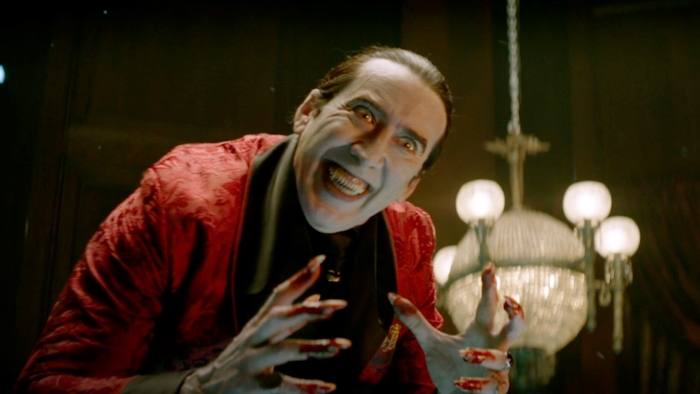
10. Renfield (2023)
Renfield is a horror comedy film directed by Chris McKay and released in cinemas in April 2023. Based on Bram Stoker’s classic novel Dracula, it tells the story of Renfield’s past and his falling out with Count Dracula.
The film stars Nicholas Hoult and Nicolas Cage as Renfield and Dracula. The performance of the Asian-American Awkwafina is also noteworthy. Directed by Chris McKay, well known for his work on The LEGO Batman Movie and The Tomorrow War.
Hoult’s role is one of the highlights of the film. He brings charisma to the role, making Renfield likeable and sympathetic despite his dark and peculiar obsessions.
The cinematography and the visual effects are equally noteworthy. The film’s spectacular visuals create a distinctive and frightening atmosphere and the effects used to bring the creatures to life are impressive.
There are comic elements in the film, but this may be annoying and distracting for some viewers, although the humorous scenes are really well done and offer a new take on the horror-comedy genre. A lot of time is spent on Renfield’s growth as a character. Even if some viewers may find the film slow, it is well worth watching and will certainly not be a waste of time. The production team has really done their best to lift our spirits.
Overall, Renfield is a somewhat confusing film. Although there are some flaws in the film, fans of the horror genre should still watch this film to see how the director and the actors have approached the genre in their own way. However, the film’s emphasis on character development and comedic elements may disappoint those expecting more traditional horror films. Nevertheless, this film offers a unique approach that sets it apart from standard horror films.
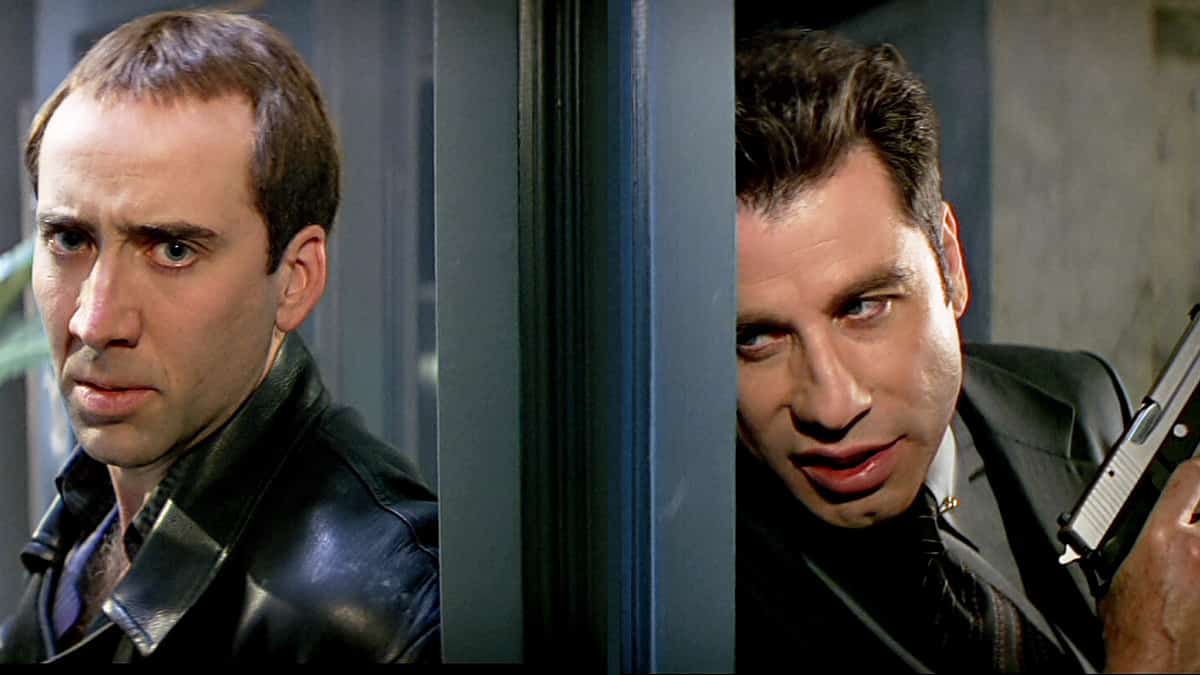
9. Face/Off (1997)
Born in southern China and raised in Hong Kong, John Woo began his career as an assistant director in 1969 at Shaw Brothers Studios, which specialized in action films that made Eastern martial arts world-famous, and Bruce Lee the most famous Kung Fu movie legend of all time.
John Woo’s first independent action film, Young Dragons: Kung Fu Kids (1973), made Chow Yun-Fat an international film star in the 1980s, when he was offered a lucrative Hollywood contract after A Better Tomorrow (1986), its sequel (1987) and The Killer (1989).
From 1993 onwards, John Woo’s own Hollywood period began.
His action films were characterized by a mixture of brutality and sentimentality (for which he was even nicknamed the “Mozart of Violence”), as well as slow-motion fight scenes that looked like a plastic ballet or a pantomime. This style was later repeated in the Hollywood films Hard Target (1993, with Jean-Claude Van Damme) and Broken Arrow (1996, with John Travolta).
Face/Off could be called the third film of a trilogy.
Here, a dangerous and cynical terrorist, Castor Troy (played by Nicolas Cage), accidentally kills the son of FBI agent Sean Archer (played by John Travolta). Six years later, the irreconcilable enemies finally meet, and the maniac ends up in prison for his black deeds. But he has managed to plant a powerful bomb that could wipe out the whole of Los Angeles. An unprecedented medical and secret service operation is hastily planned and launched, with the deadly antagonists having to swap not only locations but also identities.
The film, as one would expect, has all the necessary ingredients of a good action film – a great plot, a tightly constructed storyline, unexpected and often shocking twists and turns, and a precise musical tempo, as if set to a metronome.
But there are deeper, even philosophical undertones in this film. The main conflict between the antagonists is, of course, developed into a monumental battle between Good and Evil.
There is no shortage of associations with the ancient Bible, Greek mythology and even… astronomy. John Travolta’s character Archer’s surname in the zodiac means Sagittarius (Sagittarius or Archer), and Nicolas Cage’s villain Castor’s name is certainly not a coincidence, but it is also a coincidence that it corresponds to the second-brightest star in the constellation Gemini, and to the name of the son of Zeus and Leda, Castor (Castor’s and his twin brother Pollux’s syndrome!).
Archer’s wife’s name is Eva and Troy’s son is Adam.
Another detail that is not obvious at first sight: the prison where the terrorist is being held is called Erewhon, an anagram for nowhere.
Uncharacteristic of traditional action films, the soundtrack of Face/Off is also unexpectedly full of classical masterpieces such as Handel’s Messiah, Mozart’s Die Zauberflöte or Chopin’s Prelude.
Sometimes it’s a real pleasure to decipher the references on the surface or deeper down.
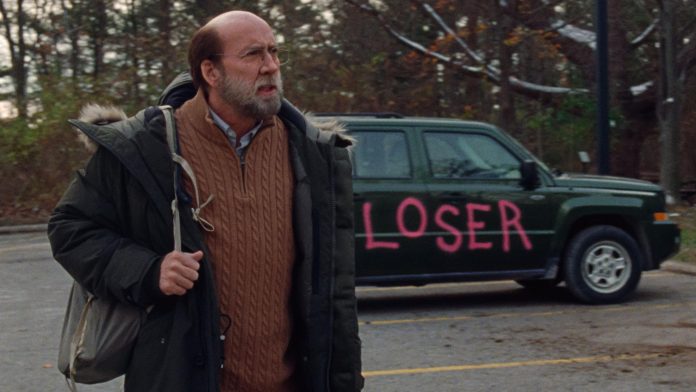
8. Dream Scenario (2023)
It is difficult to say whether Kristoffer Borgli’s Dream Scenario is a comedy or a horror film: it is marketed to the public as a comedy by its makers, but the film itself is often filled with frightening music or sounds, it is full of uncomfortable scenes that are very likely to be funny, but which also make us feel uncomfortable, and it is violent. However, despite the film studio A24, which has always had a penchant for horror, I would consider Dream Scenario to be a strange comedy starring – even stranger – action movie hero Nicolas Cage in the lead role.
The events in the Dream Scenario take place on two planes: reality and dreams. These two dimensions eventually overlap, and it becomes difficult to distinguish them from each other.
The protagonist, Paul Matthews (Nicolas Cage), is a university professor who claims to have brilliant ideas, but who is, by his own admission, a complete mediocrity. Polo is not respected by his students, his children, or his colleagues. It is not clear whether this is due to his indecisiveness, his poor appearance, or his unfortunate character traits, such as sniffling, zinging and self-pity. In a word, Paul is like the anti-hero of the film. Except that antiheroes also have distinctive attributes, and Pol is a modern-day Superman, that is to say, a middle-class nobody, a person with whom the majority of the planet’s population can currently identify.
The choice of the frame of the plot is very simple but brilliant: we are introduced to a mediocre Paull, who is starting to have strange things happen to him – people all over the world are dreaming about him. They are dreaming under very strange circumstances: bad things are happening to them, and Paul is just standing by and watching. Or walks by and watches. In real life, this strangeness is what gets our modern-day Superman in the news and famous. Fame completely turns his head, and a university professor is even about to write a book.
Then things take a completely different, unexpected turn – Paul goes from being an observer to a participant in people’s dreams. A participant in a not entirely positive sense. And this affects his whole life in reality. So much so that there is no turning back. The film is essentially a critique of the obsession with technology in our lives. Because just as Paul has entered the dreams of humanity, our phones and other smart devices are usurping our consciousness without us even realizing it. Smart devices record our every word and, in fact, sometimes it seems even our every thought, using them for their own purposes.
There are quite a lot of fantastic elements in the film, which are reminiscent of magical realism. There are also a number of absurd situations that are gruesome and blood-curd, but which cause uncontrollable laughter. Thus, this film can also be called macabre.
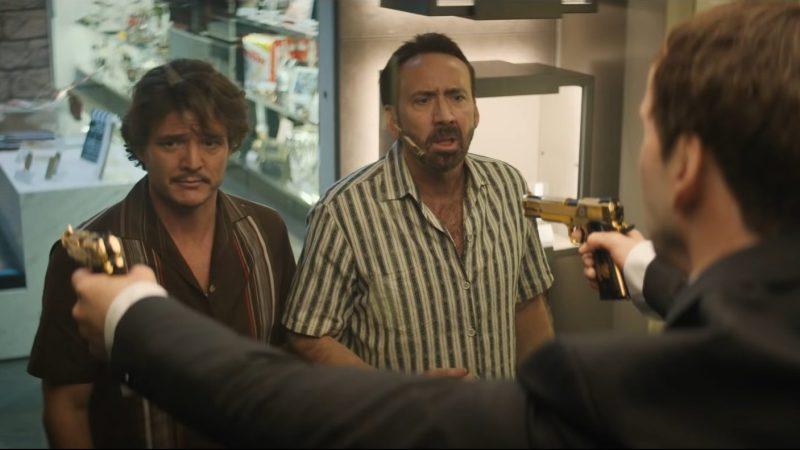
7. The Unbearable Weight of Massive Talent (2022)
The Unbearable Weight of Massive Talent is undoubtedly one of the most exciting films of 2022, brilliantly revealing the glitz, poverty, and absurdity of Hollywood, while Cage confirms to himself and the audience that he is one of the best actors of his generation. There is no denying that he has a distinctive style, which is sometimes criticized as “overacting”, “mega-acting”, and sometimes it is said that Cage is more like a performer than an actor. In any case, his acting is not only award-winning, but has also achieved a cult and meme culture.
Cage thus plays a version of himself, an actor who obsesses over his career as it moves towards the sunset and cannot accept that his greatest days of glory are behind him. After another unsuccessful audition, Nicolas Cage, abandoned by his family, disillusioned and drowning in debt, decides to attend a fan’s birthday party in Spain for a million dollars and then announce the end of his career, even though he feels humiliated. But this plan backfires and the audience is drawn into a sadly funny action comedy that pokes fun at itself and the film industry.
Cage is impeccable in this role. Though he said in an interview that in a way playing a ‘version of himself’ was an intriguing challenge that he did not immediately accept, the actor ultimately decided not to see the film. He said it would be too psychologically difficult. It is true that even the fictionalized story of the real Cage comes close in some ways to the failures of the actor’s personal life (e.g. debts, poorly rated films, and roles). This is not the first time that actors played themselves (think John Malkovich in Being John Malkovich), but the success of this film shows that the exploration of such themes is still attractive in Hollywood. In any case, this is not just a film about acting, but about the paradoxes of the film industry and production itself. It deals with these themes in a rather light-hearted way (it is a comedy, after all), but at the same time in a sensitive way.
Although it would be very convincing to think that the audience’s attention would be focused solely on Cage, Pedro Pascal, who plays the millionaire fan whose birthday is celebrated by the sceptical protagonist, also does an excellent job. Javi, played by Pedro, quickly becomes a screen celebrity. One of the things that film critics and audiences always look for is whether there is a so-called “chemistry” between the main actors, whether they fit together, whether they complement each other’s roles and stories.
Nicolas and Pedro play well together, giving the film an emotional depth that is sometimes lacking in comedies. The performances of the other talented actors are also of high quality, but the stories of their characters remain secondary roles. Perhaps it is not surprising when the main idea of the film revolves around a mega-star like Nicolas Cage.
This film is an ode to Nicolas Cage’s talent and career. The film of the actor will be satisfied after watching the film, understanding the nuances of the film and reassured that Cage’s future in the film industry is not really in danger, while film critics will be reminded once again why he is considered one of the greatest actors of all time.
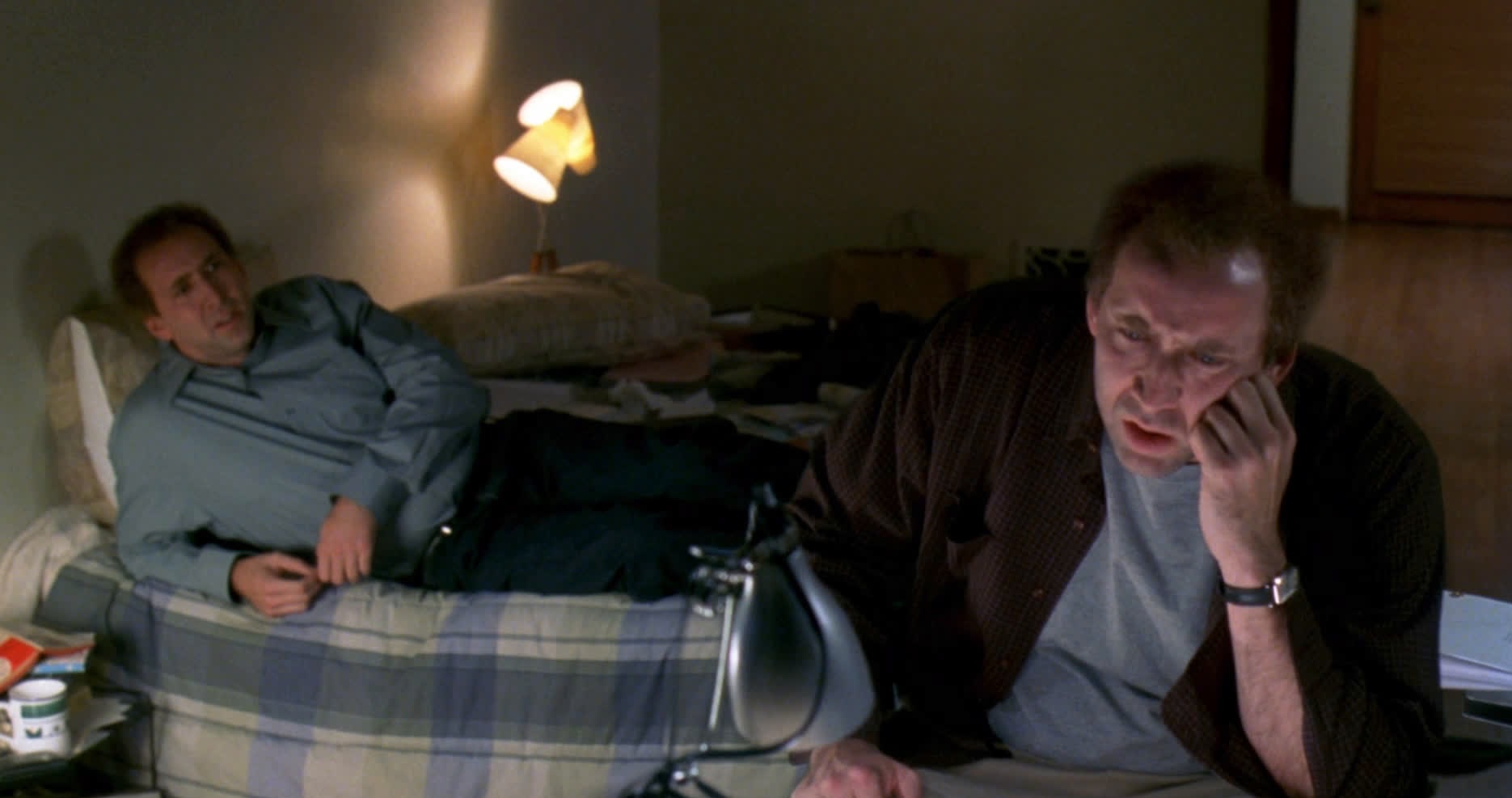
6. Adaptation (2002)
In 1998, eccentric screenwriter Charlie Kaufman wrote the original script for Being John Malkovich, which he turned into a bizarre film with young director Spike Jonze.
This modest cinematic joke soon became widely known in a small circle of cinephiles, and the expectation was high for more intellectual derring-do from the successful debut of this duo. Two Golden Globes and an Oscar for Supporting Actor for Adaptation.
Both Being John Malkovich and Adaptation have in common the problem of the manipulation of consciousness, which is so important nowadays. This time, however, the authors have fallen into a trap of their own making. According to one reviewer, Adaptation is reminiscent of a Florida swamp: “the same alligator-infested, bottomless maze, but with a beautiful orchid in the middle”. I don’t think you can say it any more precisely than that.
Experienced screenwriter Charlie Kaufman (arguably one of Nicolas Cage’s finest performances) wants to turn into a film the unusual book The Orchid Thief by writer Susan Orlean (played by Meryl Streep). The hero of this unpremeditated book is an eccentric gardener who clones rare plants and is simply crazy about orchids.
Charlie falls in love with Susan, and she falls in love with the orchid thief John Laroche (act. Chris Cooper won the Oscar for Best Supporting Actor for this role). Charlie’s twin brother David adds even more confusion to a rather complicated story. He thinks he is as good a screenwriter as any, so he is forever approaching his eldest brother with all sorts of proposals that seem silly on the surface.
David also writes a script, but a completely different script from his twin brother.
Charlie is struggling to adapt the book The Orchid Thief, which seems to have no action, but plenty of components suitable for “intellectual cinema”.
Yet David is no stranger to creative torment – he is able to create with enviable ease a script for an action film in which the staples of detective cinema, such as fast-paced action, criminals, a crashing plane, and similar banalities seen hundreds of times in cinema, will fall on the head of the prospective viewer like a horn of plenty.
It does not take long to guess which brother’s script will be of more interest to Hollywood producers.
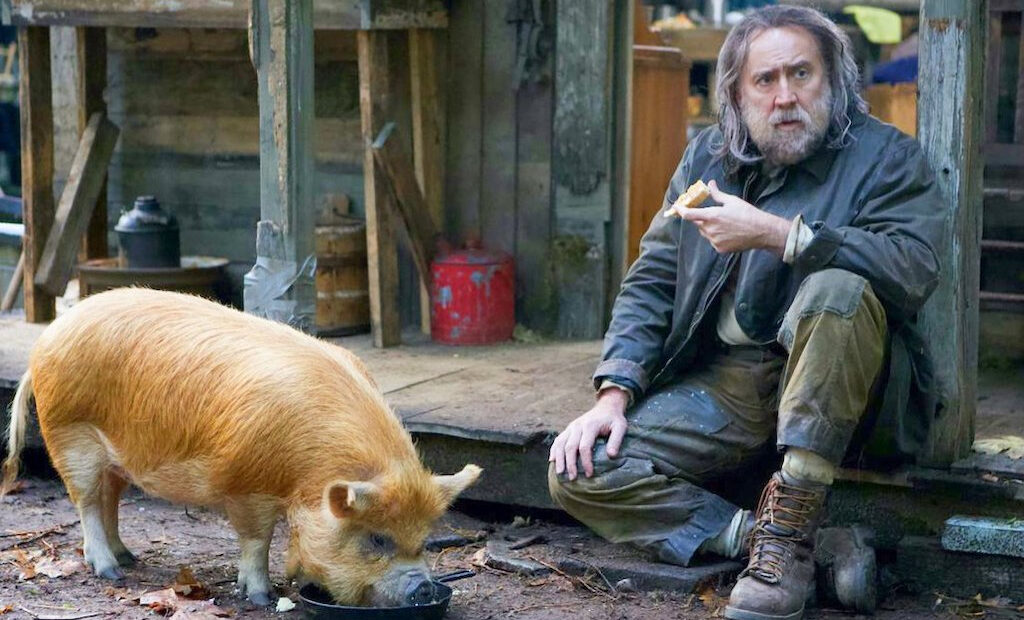
5. Pig (2021)
A great “pigsty” story. Audiences love to watch films about animals. Not just documentaries or animations, but also feature films. Or metaphorical ones, like George Orwell’s Animal Farm, in which the behavior of domestic animals bears a striking resemblance to that of humans.
Naturally, pigs are less often the protagonists in films than cats or dogs, but it is their physiological make-up that is most closely related to humans. This is evidenced, for example, by the recent sensational announcement in the medical world that a genetically modified pig’s heart has been transplanted into a man suffering from incurable heart disease in America, and that the patient, according to the medical profession, is recovering well.
One of the favorite films of both children and adults at the time was the 1995 comedy Babe, directed by Chris Noonan, about a piglet that a farmer (James Cromwell) wins at a fair and takes home with him. Here, the piglet quickly found a “mother” – a spotted shepherdess – and soon realized that he likes to chase the sheep.
The sympathetic piglet recently seen at the Spring Day Cinema in Victor Kossakovsky’s documentary Gunda (2020) is also very “human”.
And in Michael Sarnoski’s new feature film Pig (2021), this domesticated animal becomes the main partner of actor Nicolas Cage.
Nicolas Cage has long been ridiculed for being terribly indiscriminate and for always starring in rubbish. The actor’s filmography is full of projects worthy of a Golden Raspberry.
Still, the Pig does not really belong in this gallery. After watching the film, one avid film fan left the following touching post on imdb.com, the largest online film database: “This absolutely stunning and authentic film has brought cinema back to life! It’s a breath of fresh air that will touch most of your heart. I felt tears rolling down my cheeks. Respect to the entire production team and welcome back Cage; we have been waiting for this for a long time. Thank you very much.”
Nicolas Cage here played the lonely Rob, who, after his wife’s death, lives in the Oregon wilderness and collects truffles (also known as truffles) and sells them at half price to an unscrupulous middleman. When someone kidnaps Rob’s beloved pig Brandy, the man must travel to Portland to retrieve her. At the same time, it will be a thrilling journey into his long-forgotten past.
But the kidnappers have made a mistake; he’s not just any truffle hunter.
In the promotion of Pig, frequent references were made to the action films about the new-age superman John Wick, who, as we remember, becomes a ruthless fighter against all kinds of (mostly Russian) criminals after the murder of his beloved dog by villains (in the third film, it is even revealed that the character of Keanu Reeves is a descendent of… the Belarusian partisans).
Nicolas Cage’s avenger Rob might even turn out to be the same action movie superhero. But such hopes are not fulfilled in the Pig. It is not another commercial trinket, but a true “indie drama” (a term derived from the English word “independent” meaning “independent”). It is no coincidence that it premiered at the Sundance Independent Film Festival and went on to win nearly 30 awards at serious film festivals.
The Pig is more an example of auteur cinema, a kind of meditative drama, with the only scene worthy of action cinema being a fight in an underground club, but where Rob is only present in order to get the necessary information about the abductors.
As befits auteur cinema, the filmmakers take care to give the audience something to do while thinking about contexts. The film, which has a rustic and laconic, one might even say “Hemingwayesque” style, is divided into three parts with gastronomic titles (somehow related to Rob’s former profession). Portland, of course, is associated with the gloomy traditions of ku-klux-klan.
Rob himself often resembles the Orpheus descending into hell of Tennessee Williams, an American playwright who knew these places well.
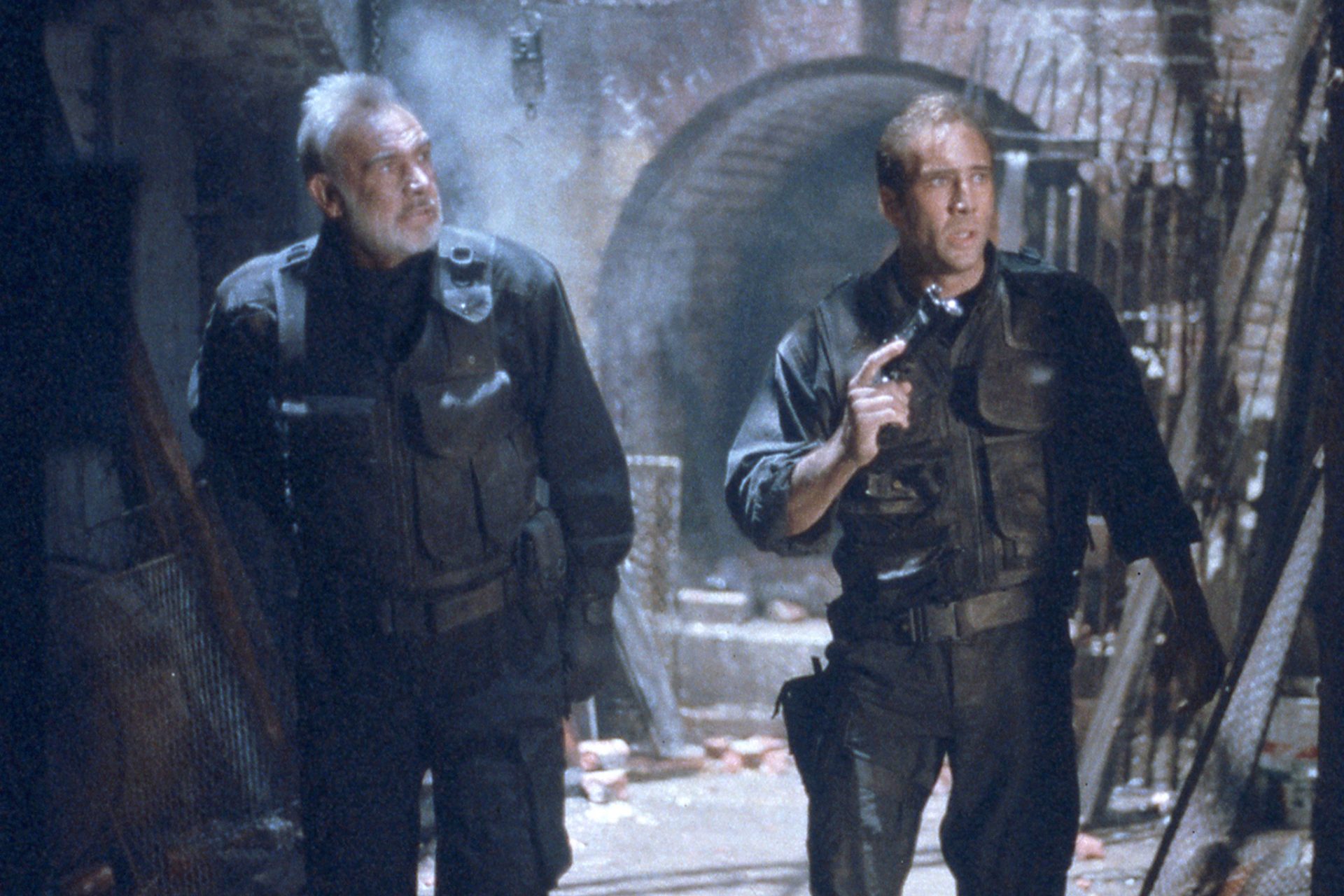
4. The Rock (1996)
In an interview in 2022, the actor Nicolas Cage, when asked how he now feels about his near-simultaneous action films Con Air (1997), Face/Off (1997) and The Rock (1996), then known as the ‘holy trinity’, replied that these films ‘aged beautifully’.
The first of these “holy trinity” films to be made was The Rock. The Rock was the laconic name given to the Alcatraz Prison, built on an island in San Francisco Bay, which has become one of America’s grimmest sites.
The Spanish called it Pelican Island and the California Indians sacredly believed it to be the home of evil spirits. When the decision was made to build a prison on this harsh island, the Indians’ fears began to be realized. The worst villains and the most brutal murderers were sent here, and during the days of the dry law, Alcatraz became a permanent resting place for American gangsters. Alvinas Karpis (real name Albinas Karpavičius), a famous Lithuanian-born American gangster, was also imprisoned there.
FBI Chief J. Edgar Hoover has proudly said on many occasions that Alcatraz is the only prison in the world from which there is no escape. Still, the desire for freedom is always stronger than any prison walls. Some have managed to escape from this hell.
In all, 14 escapes took place during the lifetime of the prison (from 1934 to 1963), when as many as thirty-four prisoners managed to escape from behind the heavily-guarded walls of “The Rock”, usually for a very short time. Two men attempted to do so twice, fifteen were caught, eight surrendered, seven were shot, one was officially declared drowned, and another five were reported missing.
They did not include the characters in the film directed by Michael Bay and played by Sean Connery and Nicolas Cage.
When Alcatraz Prison was closed on 21 March 1963 due to the high cost of maintenance and its poor reputation, a museum was set up there.
John Patrick Mason (played by Sean Connery) managed to escape from Alcatraz alive and is now guarded by the secret services (presumably to prevent him from spilling “state secrets”). But the US federal authorities soon need his skills, as the museum-turned-prison has become home to a hit squad led by General Francis Hummel (Ed Harris), who is demanding huge compensation from the government for the families of the fallen soldiers and for the dignified pensions of the survivors of all the military operations carried out in the US. If the hundred million dollars demanded by the terrorists is not paid within 40 hours, they are threatening to wipe San Francisco off the face of the earth with poison gas rockets.
Mason will therefore have to repeat his march. Only this time in the opposite direction. Because he knows the ins and outs of Alcatraz. With its labyrinths and secret exits, Alcatraz could easily rival any medieval castle.
Mason’s main assistant will be the chemical weapons expert Dr Stanley Goodspeed (Nicolas Cage). While he starts out as a scientist, a true laboratory genius, he later takes the lead as an action movie (super)hero, and at times even sidelines Sean Connery, who is very familiar with action cinema!
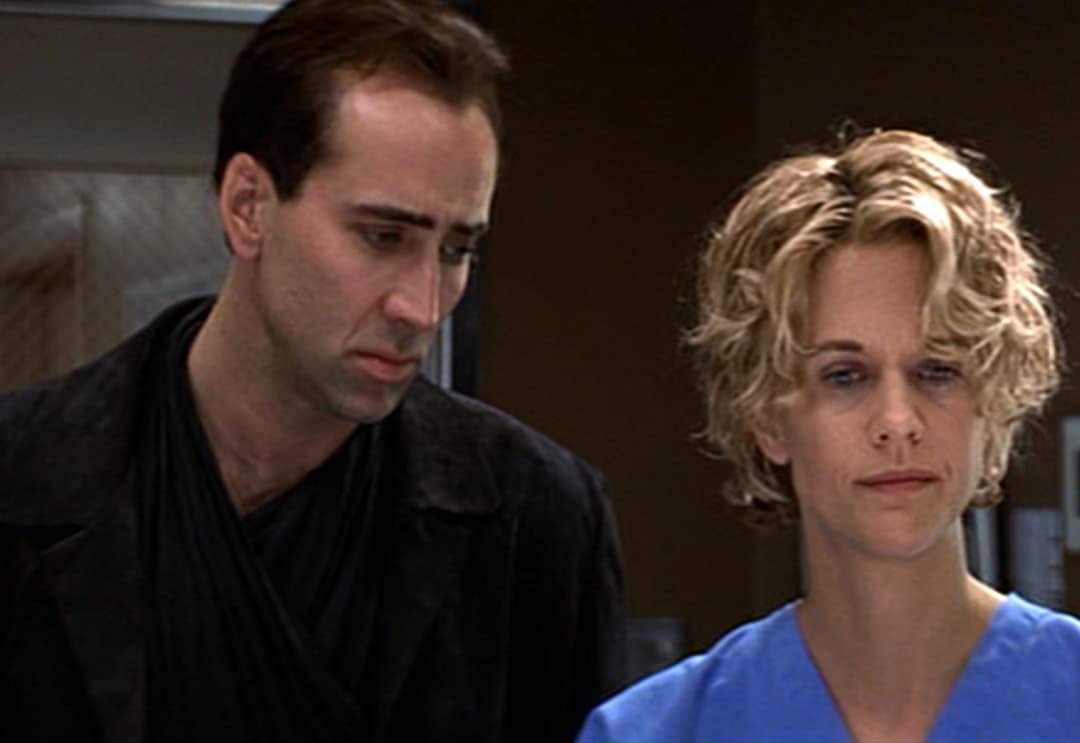
3. City of Angels (1998)
There has never been a shortage of angels in American cinema. Even among the masterpieces of classic Hollywood cinema, there are many films that mention such characters in their titles (Only Angels Have Wings, We’re No Angels, Angels with Dirty Faces, and countless others).
In more recent cinema, winged creatures have been played by Paul Hogan (Almost an Angel, 1990), John Travolta (Michael, 1996), and even Ben Affleck and his friend Matt Damon (Dogma, 1999).
In 1998, Nicolas Cage did the same. Only if the above-mentioned colleagues have portrayed angels in comedies, it would be sacrilege to call City of Angels a comedy.
For City of Angels is an American remake of that masterpiece of European cinema, Wings of Desire (1987).
In this film by German director Wim Wenders, two winged beings descend from the heavens into the German capital, still divided by the Berlin Wall, and they are real angels, able to read people’s minds, but already weighed down by the burden of the years and the world’s wisdom accumulated over the centuries. They do not care much for the lure of the eternal kingdom of heaven, but prefer the joys of ordinary mortals, even if they are clouded by a sense of existential impermanence. One angel, Daniel (Bruno Ganz), even falls in love with a beautiful circus acrobat, which causes him to lose his wings and adds to the ever-expanding ranks of the “fallen angels”.
In the remake of Wings of Desire, City of Angels, Nicolas Cage played a similar sad angel, Seth, sent from the heavens to ease the suffering of the dying. He knows neither fear, hunger nor pain. But he is no stranger to the mundane emotions experienced by ordinary mortals.
But when he sees the surgeon Maggie Rice (played by Meg Ryan) in a hospital operating theatre, Seth falls in love with her and resolves to trade immortality for simple human happiness. But for her, of course, he risks no longer hearing the divine music as each day dawns and ends.
Wim Wenders dedicated his masterpiece Wings of Desire to the “three angels of cinema” – Tarkovsky, Ozu and Truffaut.
Brad Silberling (famous for his adventure film Casper about a silly ghost) dedicated his City of Angels to Dawn Steel, one of the producers, which unfortunately did not receive a premiere.
As a commercial project, City of Angels paid off (it cost 55 million dollars and made nearly 200 million). Wings of Desire, unfortunately, cannot boast similar figures. But it doesn’t need to!
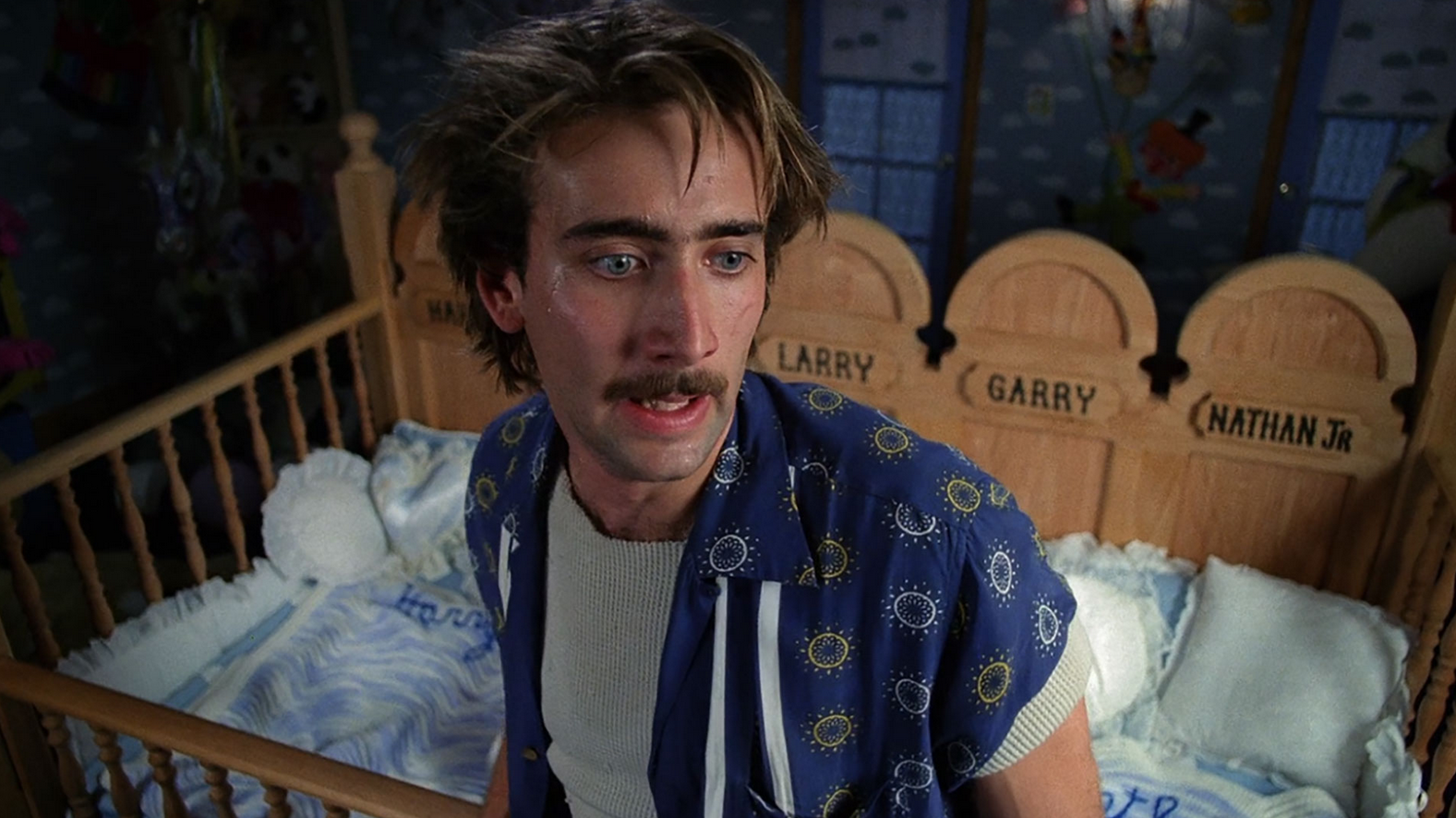
2. Raising Arizona (1987)
In 1984, the previously unknown brothers Joel and Ethan Coen entered the world of cinema (as it is now fashionable to say, “with a bang”). Their debut crime film, Blood Simple, instantly catapulted the duo to the status of cult figures in American independent cinema. The young filmmakers managed to tell the story of a jealous husband hiring a private detective to track down his wife, a story seen hundreds of times before, in a way that made their grim and bloody film an early cult hit.
Immediately after this brutal debut, the brothers went in the opposite direction with the genre-breaking comedy Raising Arizona.
Here, the main character is a thieving loser, McDunnough (Nicolas Cage), who is given the chance to become a decent man for once. As he finishes his prison term, he falls in love with and marries policewoman Edwina (Holly Hunter). After a while, it becomes clear that the lovers are not destined to have offspring. Edwina was very upset about this, and her husband started to act as he was used to. He had learnt the most important rule of thieves – you can always steal what you don’t have…
The strange title Raising Arizona disturbed the distributors in some countries, and they gave the film another title, which they considered more specific, Arizona Junior. Arizona is not one of the many American states, but the name of the kidnapped child, like his real father, furniture magnate Nathan Arizona.
The kid in this film is really great, and before he has learned to walk, he is as mischievous and inventive as if he were Kevin from the comedy Home Alone (which, incidentally, was made three years later).
And yet, Kevin Costner was originally offered the role of McDunnough, but refused to take part in such a dubious and bizarre project.
For Nicolas Cage, however, the role was the perfect opportunity to go wild and experiment with his character and even his appearance. It alone evokes an indulgent smile when he sees a still young (he was 23 at the time) and very thin Nick in a brightly colored Hawaiian shirt, tangled hair and comical tank top of Elvis Presley.
The acting is really pleasantly surprising, unencumbered by the stamps that were acquired later and used frequently. The actor changes the register of emotions with real skill, instantly shifting from the eccentricity of a fairy tale to the lyrical intonations of humor. Though this very rich character often behaves unpredictably and even immorally, he immediately impresses the audience. It is not for nothing that Cage himself was dubbed the ‘new beat’ after this film, until Johnny Depp, who also played a whole gallery of ‘wacky’ freaks at the start of his career, began to claim that title.
Raising Arizona is also notable for its other vivid character performances: Frances McDunnough’s policewoman Dot now looks like a rehearsal for the brothers’ later masterpiece Fargo.
The burly John Goodman has become a kind of mascot for the brothers, who later graced other Coen films with his performance: here, Goodman, together with William Forsythe, plays the prison escapees in such a way that you have to see their escape through the underground tunnel, it’s beyond words!
Today, the Coen brothers are solid and recognized classics. It is all the more pleasing to see how happy they were when they used to call the film set a “sandbox” for their games.
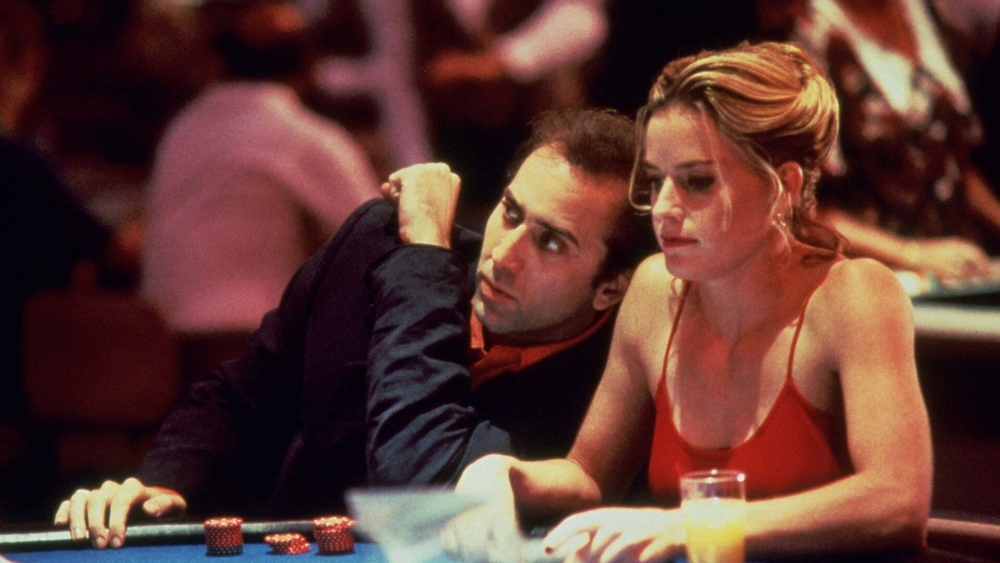
1. Leaving Las Vegas (1995)
Based on the novel by John O’Brien, this film directed by Mike Figgis (Stormy Monday, Mr. Jones, The Browning Version) was named the best film of the year even before the Oscars (over 100 critics in the pages of the influential The New York Times agreed with this opinion). After such a “pressing”, the esteemed academics who distribute the gilded Oscar statuettes simply could not ignore the vox populi, but out of the four nominations (Best Picture, Best Director, and Best Performance by an Actor in a Leading Role), only one made it to the “flesh” stage – the prize for actor Nicolas Cage. He played an alcoholic screenwriter who loses his job because of his bad habits.
Unable to resist the strongest passion of his life, Ben Sanderson travels to the gambling paradise of Las Vegas in a sea of neon lights, only to find eternal oblivion and to drink “until his last breath”. Before taking this step, he destroyed all signs of his former life – after being fired from his job, he sold his house and burned his photos.
The authors do not make much of an effort to give reasons for the hero’s downfall; Ben himself simply does not know (“I don’t know whether I started drinking because my wife left me or whether my wife left me because I started drinking”). The authors give Ben the opportunity to pause and to start his life anew once he has realized the depth of his degradation. Ben’s encounter with Sera (Elisabeth Shue), a prostitute who dreams of escaping her pimp’s protection and discovering true love, becomes a glimmer of hope. But it’s already too hard for Ben to change anything in his life, even for love.
Ben’s refined agony lasts for a very long time, as does the film’s depressing mood, and the melancholy is deepened by the almost constant and unobtrusive blues compositions (some interesting improvisations are played by the director himself, Mike Figgis, with the help of Sting). Is it any wonder then that film critics’ reviews have called it Las Vegas Blues, Mildly Drunken Rhapsody or simply Down to the Bottom.




